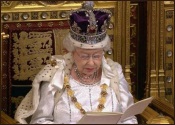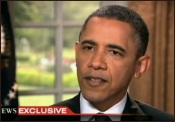Profiles in Timidity and Courage
 The Queen’s Speech was long on pomp, short on circumstance. I’ve listened to a fair few of them since I arrived in Britain over 20 years ago, but I don’t recall one quite like this. The Queen is a consummate professional, and she usually reads out these speeches without any trace of emotion. Her words are deliberate, her tone is steady. However, this year I thought I heard a difference: it sounded to me as if she was bored. The programme she outlined was singularly unambitious: we’ll attend to the economy, it stated. Well, given that this is at the forefront of everyone’s mind, this item was no particular surprise. It said, we’ll do House of Lords reform, if we can: meaning, if the Coalition partners and Labour can stop bickering over it. We’ll improve the lives of children: and here I was thinking that they would publically state they’d take away their pocket money and teddy bears. We’ll reform the banks: hopefully, but given how hand in glove the Conservatives have been with financiers and how in thrall to money they remain, good luck with that. Apart from this, it was small ball, small beer, a shrunken, shrivelled agenda which will achieve, at best, incremental change.
The Queen’s Speech was long on pomp, short on circumstance. I’ve listened to a fair few of them since I arrived in Britain over 20 years ago, but I don’t recall one quite like this. The Queen is a consummate professional, and she usually reads out these speeches without any trace of emotion. Her words are deliberate, her tone is steady. However, this year I thought I heard a difference: it sounded to me as if she was bored. The programme she outlined was singularly unambitious: we’ll attend to the economy, it stated. Well, given that this is at the forefront of everyone’s mind, this item was no particular surprise. It said, we’ll do House of Lords reform, if we can: meaning, if the Coalition partners and Labour can stop bickering over it. We’ll improve the lives of children: and here I was thinking that they would publically state they’d take away their pocket money and teddy bears. We’ll reform the banks: hopefully, but given how hand in glove the Conservatives have been with financiers and how in thrall to money they remain, good luck with that. Apart from this, it was small ball, small beer, a shrunken, shrivelled agenda which will achieve, at best, incremental change.
Indeed it was so unambitious that crucially important items were put into “draft bills”, which mean they are “incomplete proposals to be finalised later”: among these were pressing issues like care for the elderly and regulation of the water industry. Given that people are being reduced to penury in order to maintain their well being in their dotage and that the water companies are so feckless that they want to maintain a hosepipe ban after the wettest April in many years, you would think that a bit of urgent action was required. However, this government can’t even bring itself to enshrine in law its commitment to giving .7% of GDP to the poorest countries; it says it will do it in practice, as Caroline Spelman, the Environment Secretary, was at pains to point out on Radio 4’s PM Programme yesterday, but there is an altogether Prufrockian standard being upheld by its inability to set the matter in stone. After all, “in a minute there is time for decisions and revisions which a minute will reverse.”
Taken as a whole, the Queen’s Speech was a series of clichés mixed with platitudes, a soporific to the sensibilities of an intelligent electorate; after 60 years on the throne and having dealt with the likes of Winston Churchill, Clement Attlee and Harold Wilson, it was no wonder that Her Majesty was unenthusiastic. Her current ministers, in contrast to Ernest Bevin, Roy Jenkins and Harold Macmillan are a singularly uninspiring bunch: they cower before television cameras rather than stand in defiance of what might be said about them. Manny Shinwell, the famous Labour Minister of Fuel and Power responsible for nationalising the coal industry, once challenged his critics to come down to the mines and help dig; it’s difficult to imagine anyone other than Vince Cable throwing down the gauntlet with such flair. The men in government now are altogether smaller, greyer and worse, they preen.
Nevertheless, one can take some satisfaction from this situation. Look at Greece: their politicians are long on charisma and rhetoric about smashing the banks, smashing the ruling class, crushing, breaking, changing, ripping up. Cry havoc and let slip the dogs of renegotiation, they say. However, the result is near anarchy and a credit rating that wouldn’t merit a loan from Wonga.com. Perhaps in an era that’s all too exciting in many respects, being dull and uninspiring is a better option. We may grumble, we may stand in the thin drizzle of disappointment underneath the grey skies of cynicism, but at least we know where we are. There is little room to be disappointed: no one has promised utopia or even a pleasant suburb within commuting distance. Cameron has even begun to parrot Gordon Brown’s phrase from the darkest days of the recession: he said he was taking “tough long term decisions”; shortly after uttering this, the stench of political death followed Brown right into an election night rout. Maybe the biggest glimmer of genuine hope is that a similar fate will befall his Tory successor. Maybe we should just accept that the hour of talent has passed, and that we are in an “X Factor” world, one in which the public chooses the least mediocre among mediocrities.
 Or maybe not. If the Queen’s Speech was a profile in timidity, yesterday, President Obama provided starkly contrasting portrait of courage.
Or maybe not. If the Queen’s Speech was a profile in timidity, yesterday, President Obama provided starkly contrasting portrait of courage.
The President is taking a massive risk: it’s an election year, after all. In order to secure a second term, he needs to win states like Ohio and Florida, neither of which are necessarily liberal on social issues. In 2008, he won the state of North Carolina; North Carolina has now enshrined a ban on same-sex marriage in its constitution, a proposal that won in excess of 60% of the vote. We can now safely assume he has thrown away this state and its precious electoral tally.
Furthermore, saying anything positive about marriage equality pumps oxygen into the lungs of the conservative movement, which was moribund after a bruising Republican primary. It also sets the evangelical cauldrons to boil and steam and rage; the far right, which was hitherto unconvinced by Romney, will definitely be at the polls this November. Romney now has an issue which he can use to portray Obama as a radical. Any positive statement was incredibly risky, even dangerous; it was also unnecessary. He could have just have easily made soothing noises, said something about the time not being right, and yet maintained the support of his base. However, President Obama had considered the matter, come to a conclusion and took a stand. All hell has already broken loose on American talk radio and in the festering media citadel of Fox News: but Obama apparently decided, “This is right.” Rather than cower before his opponents, he has defied them. He has made himself an altogether more consequential figure because of his willingness to contend with adversity; if he rises above it, his greatness will be secured.
It is difficult to see David Cameron or Ed Miliband being quite so courageous. The bravery they excude is the kind that comes from having a position that is difficult to assail. Miliband may launch effective rhetoric bashing the government, but it is difficult to see what he would do differently: his own ministerial front bench often has problems backing strikes, despite the fact that it was the trade union movement which created the Labour Party in the first place. What would he face down to fix the deficit? Whose interests would he defy? Would he inflame a great opponent, dare them to take him on and then rise above them? I’m not sure; and the wavering of the polls over time suggest that the public isn’t sure either.
As for Cameron, he only faces down opponents that the public picks for him. The public is worried about the deficit; he’ll fix that. Prior to the deficit being an issue, he was “sharing the proceeds of growth”. Does the public want crime to be tackled? Yes, he’ll do that too. Cameron can always be seen leading the charge from the back, and if he’s accused of aimlessness and drift, he’ll blame his coalition partners, as he did in the Daily Mail yesterday, for his timidity. In the meantime, the drizzle of disappointment continues to fall, the country stagnates, progress becomes a word for yesteryear.
We should not accept this. Even in the era of 24 hour news and relentless media coverage and Twitter spewing forth opinions (both informed and otherwise) in a flood, President Obama proves one can be a rock standing tall and proud against the tide. Perhaps if he’s successful, his profile in courage will be accepted as an example to others. Perhaps the circle will turn, and the hour of the inspired will arrive once more.


